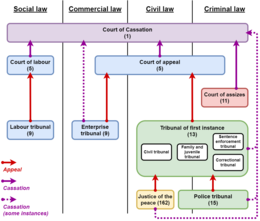 |
|---|
|
|


The justice of the peace (Dutch: vredegerecht, French: justice de paix, German: Friedensgericht) is the small claims court in the judicial system of Belgium, and stands at the bottom of the Belgian judicial hierarchy. There is a justice of the peace for each judicial canton, which is the smallest geographical subdivision of Belgium for judicial purposes. Most judicial cantons cover multiple municipalities, except in the case of larger towns and cities, which are often divided into multiple judicial cantons. A judicial canton has an average population of 50,000 to 60,000 people, but some have a population as low as 30,000 people or as high as 100,000 people. The justices of the peace only have jurisdiction over their own canton. As of 2017, there are 187 cantons with as many justices of the peace in Belgium, who hear cases in 229 seats.[1][2]
A judge of the peace (Dutch: vrederechter, French: juge de paix, German: Friedensrichter) chairs the justice of the peace. Judges of the peace are professional, law-trained magistrates who are, like all judges in Belgium, appointed for life until their retirement age. The judges of the peace hear cases as single judges, but are always assisted by a clerk. Because the justices of the peace hear only civil cases, there is (generally) no prosecutor present during their hearings. Both the claimant and the defendant in a case can be assisted or represented by counsel, but this is not required. Lawyers or notaries can act as locum tenens judge of the peace whenever the judge of the peace is absent. The organisation of the justices of the peace and their rules of civil procedure are laid down in the Belgian Judicial Code.[1][2][3]
- ^ a b "Vredegerecht" [Justice of the peace]. www.tribunaux-rechtbanken.be (in Dutch). College of the courts and tribunals of Belgium. Archived from the original on 2019-04-25. Retrieved 25 April 2019.
- ^ a b "Judiciary – Organization" (PDF). www.dekamer.be. Parliamentary information sheet № 22.00. Belgian Chamber of Representatives. 1 June 2014. Retrieved 25 April 2019.
- ^ "Judiciary – Breakdown of law" (PDF). www.dekamer.be. Parliamentary information sheet № 21.00. Belgian Chamber of Representatives. 26 June 2014. Retrieved 25 April 2019.
© MMXXIII Rich X Search. We shall prevail. All rights reserved. Rich X Search


